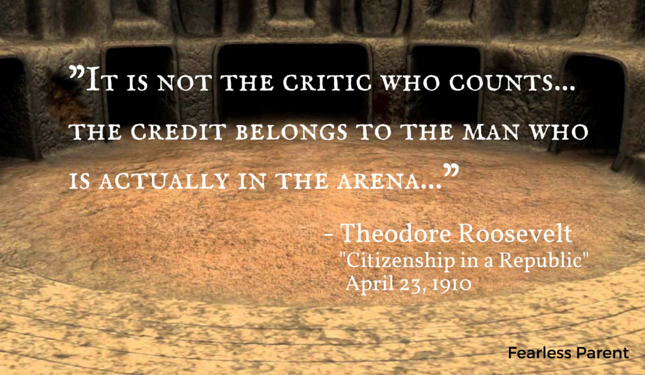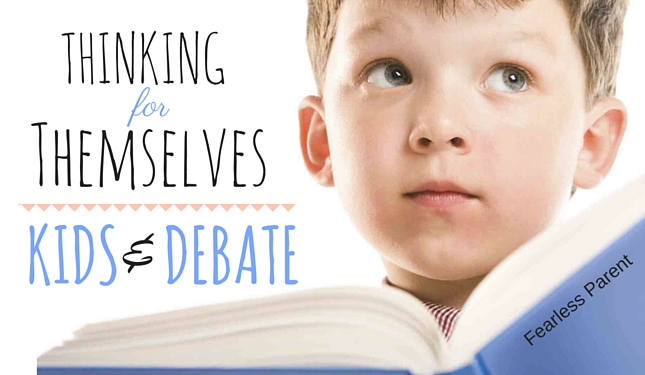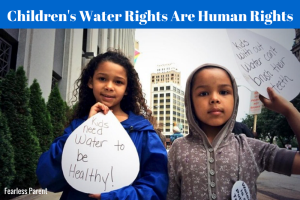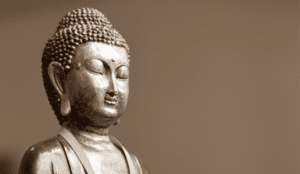Like and follow us on Facebook and Twitter. Sign up for our list here.
This article is copyrighted by Fearless Parent™ 2016
by Louise Kuo Habakus
We Americans pride ourselves on being iconically independent. We have a maverick spirit… you know, don’t tread on me, don’t tell me what to do, and all that… we have minds of our own, right? So what’s the deal with all the herd behavior… medications (1 in 4 women are on antidepressants!)… cell phone usage (average age for first cell phone is ten)… and the insane things many children do in the name of college.
We can take this discussion in a lot of different directions, of course. In this post, I want to talk about placing a value on independent, critical thinking. As parents, we want to get our children thinking for themselves.
What do schools in America value?
Even if we don’t agree on all the problems, more people are using the word failure to describe our schools. Here’s some of what I’m hearing from parents and educators in the trenches:
- Top down, unidirectional learning using outdated curricula
- Focus on conformity, and rote memorization
- Too much mindless, repetitive homework
- Absurd reliance upon testing — teaching to the test, PARCC
- No distinction between facts and wisdom
- Focus on under- and over-achievers — kids in the middle get lost and discouraged
- Everyone (who can afford them) has tutors
- Undue emphasis on visible, punitive measures
- Teachers feel unempowered and stuck
- Undercurrent of politics and unfairness — money, favoritism, corruption, corporate influence
- Technology for technology’s sake, creating distance between teachers and students
- Kids are uninspired and bored — when they act out, they are labeled and even medicated
- Not enough experiential, hands on learning
- No focus on social-emotional development or conflict resolution skills
You’d think we want obedient kids with a photographic memory who are grade hounds, good test takers, and rule followers. But-but… this isn’t what we want at all! We want to engender a love of learning and promote critical thinking.
Is this a formula for success?
Um, no. We may disagree on the metrics, but on a macro level it appears that US kids are falling behind relative to students in other countries.
So maybe we don’t like the hardcore methods of power assertive parenting. But we’re back to the fact that school isn’t working for many children. Teaching doesn’t seem to be vitally connected to learning. Kids aren’t reading as much as they used to. Many hate writing. They don’t seem very interested in the world around them. They are escaping into video games and social media. Intuitively, we know that grades can’t come close to capturing a child’s abilities let alone her potential.
We know this and we worry. The world is changing so quickly, we can hardly keep up ourselves. It’s tempting to lapse into a kind of desperate “keeping up with the Joneses,” plowing money into test prep, tutors, and all kinds of enrichment. Is it so important to go to Harvard, perform in Carnegie Hall, or get a baseball scholarship? At what price? Do we really care about these things intrinsically? I believe this is why homeschool enrollment is exploding. Millions of parents have opted out of the traditional school route and are customizing an educational experience that makes sense for their children. It’s not for everyone, of course. We’re giving it a try for our 12 year-old this year.
What do we really want for our kids?
We want our children to become happy, motivated, and independent adults who will take risks to find and express great passions in their work and relationships. Maybe the relevant question at hand is whether we are equipping our kids with what they will need to pull that off.
- Do they have the skills for self-expression? and
- Do they have the freedom, the agency, and the chutzpah to push boundaries and even break rules?
What skills are we talking about? I believe they must include:
- Curiosity about the world
- Clarity of writing and speaking
- Ability to vet sources and research facts
- Ability to organize thoughts
- Attentive listening
- Empathy to understand multiple sides of an issue
- Ability to construct a persuasive argument
- Discipline to hold their ground
- Courage (and opportunity) to enter the arena

These are the reasons that I talked with my 15 year-old son — who attends a magnet school — about going to a debate camp this summer.
Whaaat… debate? Are you kidding?
Nope. Debate is great. We need to amp up the feistiness level in our kids, and get them engaging and caring about issues in the world. Debate is certainly not the only way to do this. But it’s definitely a very good one.
I debated in high school. OK, I’ll come clean. I didn’t want to do it. It didn’t appeal to me at all and it wasn’t just because it felt geeky. The whole idea of public speaking (in front of judges, no less) made me want to throw up. But a dear mentor asked me more than once. And I have this masochistic streak about facing fears. I ended up loving it. You could say that it became a habit 😉
Why debate?
I could start with a list of famous people who debated, including Nelson Mandela, Oprah Winfrey, Margaret Thatcher, George McGovern, Kofi Annan, Janet Reno, Antonin Scalia, Tom Brokaw, Jane Pauley, Larry Summers, Lee Iacocca, Malcolm X, James Dean, Bruce Springsteen, Kelsey Grammer, WIlliam Macy, James Earl Jones, Shelley Long, and John and Jim Belushi… not to mention Plato, Aristotle, and Socrates.
But that’s not why I feel debate competition is valuable. Here are my top reasons:
#1: IT TEACHES THAT WORDS ARE POWERFUL
Standing at the podium, gauging your audience, carefully choosing words to construct efficient, well-crafted arguments, and presenting them is a life-changing experience. It teaches that words can be powerful. Consider William Jennings Bryan, a former debater, and his famous Cross of Gold speech, widely considered the most effective speech ever delivered at a national party convention. It brought the house down and won this lawyer and “new and untried” Congressman the Democratic nomination for President in 1896.
Beyond communicating facts, words can inspire, heal, teach, motivate, and incite. They have the power to build up or take down, create or annihilate. Words are a way that we convey what’s in our hearts — our values, beliefs, passions, and deepest hopes. Words hold our vibration and reflect who we are. We engage in self-expression for our health and well-being, to find community, and to advocate on behalf of others. Words change the world.
#2: OUR SOCIETY NEEDS IT
Debate skills are essential to democracy and public life.
“Honest disagreement is often a good sign of progress.” — Mahatma Gandhi
It’s true. A society that can’t openly and candidly grapple with its most important issues is in trouble. Now think about the long list of subjects that no one dares discuss at a cocktail party or family reunion (and consider what happens to the hapless person who does). Any wonder why our politics are such a disaster?
When I urge passionate parents to meet with their legislators to discuss the issues nearest to their hearts — i.e., GMO labeling, vaccine exemptions, water fluoridation — the biggest reason for their hesitation, they tell me, is that they don’t know what to say and how to say it. How can we expect our political leaders to express the will of the people if we don’t have our words? We must teach our children to find their voice.
#3: IT’S DIRECTLY TIED TO ACADEMIC COMPETENCE
Research evidence links debate with academic attainment, communication skills, critical thinking, confidence, cultural awareness, and heightened aspirations. For the artium baccalaureus (Bachelor of Arts degree), medieval scholars prioritized grammar, logic, and rhetoric (reading, thinking, and speaking) and evaluated students through debates.
“[I]n recent years, research has confirmed what common sense suggests: reading and writing feed off speaking and listening. In short, the spoken word remains our prime means of communication. It is the wellspring of literacy and much else – ‘if we can’t say it, we can’t write it’, and our ability to think critically is likely to be severely limited.” — Sir Jim Rose, Chairman of the Education Committee, “Debating the Evidence,” CfBT Education Trust
We think of literacy as reading and writing but it really starts with the spoken word.
#4: “I WANT TO HIRE YOUR KID”
Whether you think it’s such a great thing to work for someone else is beside the point. Everyone, even dyed in the wool entrepreneurs, should have the experience of working for someone else. In the marketplace of people and ideas, you want to be wanted:
“Many business leaders are frustrated in their attempts to find Millennials…who seem to have the potential to lead… I’ve got a suggestion: search for those who competed in speech and debate competition in high school (or college) and hire them… [T]hey have a deep understanding of how to persuade, how to present clearly and how to connect with an audience. It’s impressive.” [Robert Scher, “How to find the millennials who will lead your company?” Forbes, 3/2/14]
For academic learning, leadership development, and civic engagement, we must equip and inspire our children — tomorrow’s men and women — to enter the arena.
***
“Why debate, mom?” I breathed through my son’s death stare and started to explain. When I added that we should head towards the things that scare us the most, he rolled his eyes, because he’s 15 and I’m the dorkiest person ever. Amazingly, he’s game anyway. If you want to check out the two-week summer camp we chose, it’s called Capitol Debate. I spent an hour talking with the founder, Ron Bratt, about his program and discovered that we’re likeminded about a lot more than debate (awesome!). They have 16 locations across the country and they’re expanding into China and Taiwan. They look to be well-managed and prioritize both expert debate instruction and kid fun. I’ll report back in the fall!
 Louise Kuo Habakus is the founding director of Fearless Parent™, lead host and producer of Fearless Parent Radio™, and mom of two. She is a published author and runs the non-profits Center for Personal Rights and Health Freedom Action. Louise was a Bain consultant and a C-level executive in the financial services industry. She holds two degrees from Stanford University.
Louise Kuo Habakus is the founding director of Fearless Parent™, lead host and producer of Fearless Parent Radio™, and mom of two. She is a published author and runs the non-profits Center for Personal Rights and Health Freedom Action. Louise was a Bain consultant and a C-level executive in the financial services industry. She holds two degrees from Stanford University.












March 2, 2016 12:00 pm
Comments 0